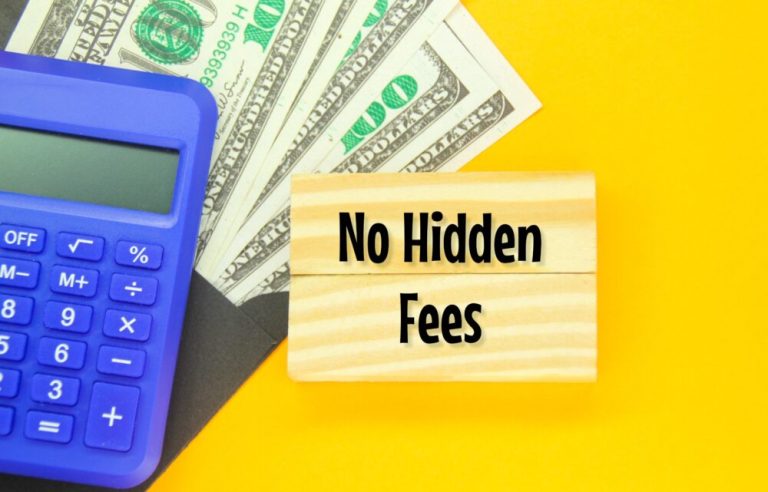Many people put money into savings in hopes of watching the balance grow over time. Unfortunately, hidden fees can quietly eat away at their balance, causing them to miss out on potential earnings or even lose money. By understanding what hidden fees are and which can harm your savings, it’s easier to avoid or minimize many of these potential costs. Here’s a quick overview of what a hidden fee is and a closer look at six hidden fees that are (potentially) silently eroding your savings.
What Are Hidden Fees?
In the simplest sense, hidden fees are expenses that people don’t expect to encounter when engaging with a business, handling a transaction, or purchasing goods or services.
The reason they’re referred to as “hidden” isn’t because they aren’t disclosed at some point; it’s that these costs aren’t widely known, so they aren’t anticipated by most consumers. Additionally, hidden fees aren’t always disclosed early in a transaction or purchase. Instead, they appear later in the process (but before the actual purchase is completed).
In many cases, hidden fees that aren’t transparently listed before a sale begins make comparison shopping challenging. Customers may only see the initial advertised cost when choosing a provider or vendor, so they use that information as the basis for identifying a solid deal. Then, as they move toward finalizing the purchase, they realize that there are additional costs that weren’t disclosed upfront, causing what seemed like a bargain to not be the deal they expected.
A prime example of hidden fees is mandatory resort fees at some hotels. Usually, the resort fee isn’t part of the advertised room price. Instead, they’re tacked on later in the booking process, and the total of the charges can be surprisingly high.
However, there are also hidden fees that can quietly erode a person’s savings. Here are some examples.
How 6 Hidden Fees Are Silently Eroding Your Savings
1. Bank Account Maintenance Fees
Maintenance fees are charges levied by banks or credit unions in exchange for the financial institution keeping your account active. Typically, they’re pulled directly from the account’s available balance on a monthly basis, and the size of the fee can be anywhere from a few dollars to more than $20.
Usually, there are ways people can avoid maintenance fees. For example, not all banks and credit unions charge them on specific kinds of accounts, so you may just need to select a fee-free account type to bypass this one. In other cases, you can skip the fees by meeting particular conditions. For example, maintaining a minimum balance above a specific threshold may work.
Ideally, you want to research the maintenance fee structure of any account you have or are considering. That way, you can find out if you’d likely have to pay the cost or if you can avoid it.
2. Inactivity Fees
An inactivity fee is a sort of financial penalty for having an account that hasn’t had a particular type of transaction – such as a deposit or withdrawal – occur within a set period. Usually, this sort of issue is easier to encounter if you have a separate emergency fund that’s already holding the amount of money you want to set aside for the unexpected. At that point, you may not make any more deposits since you’ve managed to achieve your goal. Additionally, there aren’t regular withdrawals since the point of the account is to safeguard you from potential emergencies.
Fortunately, this is another fee that’s easy to avoid. First, you can choose a fee-free savings account to hold your emergency fund. Second, you can make small deposits on a monthly basis to meet the required activity threshold. Finally, you could pay a minor recurring bill with your savings account and then transfer that same dollar amount from checking to savings right before that bill is paid, giving you one deposit and one withdrawal every month.
3. Retirement Account Fees
Retirement account fees can quickly chip away at a critical nest egg, making it harder to secure your financial future. Plan provider fees are potentially unavoidable, particularly for employer-sponsored retirement accounts. However, fund fees are something people can potentially avoid or at least reduce.
When considering funds for a retirement account, look at the expense ratios. Those summarize the fees associated with a fund, and they’re usually listed as a percentage. If you’re comparing funds that serve a similar function, choosing the one with a lower expense ratio reduces the fees you’ll pay. Choosing ETFs instead of mutual funds can also lead to lower fees.
Just make sure you don’t just factor in the fees when selecting the investments. Instead, you need to ensure that the options you’re considering all align with your overall financial goals and risk tolerance first. Then, make fees part of the equation to help you make a sound decision.
4. HSA Fees
Health savings accounts (HSAs) have clear tax advantages and other benefits, but those are potentially offset if the fees you’ll pay are high. Account maintenance fees can have a shocking impact on your balance, especially during periods when interest rates are lower.
As a result, it’s wise to look for an HSA provider that either doesn’t charge maintenance fees or waives the fee if you meet specific conditions, such as maintaining a balance above a reasonable threshold or making deposits on a regular basis.
5. Trade Fees
If some of your savings is in a brokerage account and you conduct trades regularly, transaction fees on those trades can add up fast. The fees occur when buying or selling specific types of investments, like bonds and stocks. For active traders, a fee on every purchase or sale can take big bites out of any secured profits, and that ultimately harms their savings.
Now, precisely how much a trade fee is does vary depending on several factors. The type of investment and the platform used to conduct the transaction can both play a role. By choosing the right brokerage and researching potential transaction fees on specific trades before initiating them, it’s possible to keep the cost down, allowing you to preserve more of your savings.
6. ATM Fees
ATM fees are costs associated with using an ATM to withdraw cash from an account. Typically, these fees are only levied when a customer uses an out-of-network ATM. They’re often relatively small – usually being less than $5 per transaction – but they can add up quickly. As a result, they can cause your checking or savings account balance to fall with shocking speed if you use out-of-network ATMs regularly.
Fortunately, this fee is generally easy to avoid. If you need to pull cash from an ATM, use your bank’s mobile app or website to find a nearby one that’s in-network. If there aren’t many in-network ATMs in locations where you typically need to withdraw cash, then changing to another bank (either one with nearby in-network ATMs or one that reimburses ATM fees) is potentially worth exploring.
Do you know of any other hidden fees that may silently erode people’s savings? Do you have any tips that can help people avoid unexpected costs like hidden fees? Share your thoughts in the comments below.
Read More:
- Save Money on Your Mortgage by Negotiating These Fees
- Can an Employer Charge Fees to Turnover Your 401(k) After You Quit a Job?
- Types of Mutual Fund Fees and How to Reduce Them
The post The Invisible Drain: How 6 Hidden Fees Are Silently Eroding Your Savings appeared first on The Free Financial Advisor.
Read the full article here









